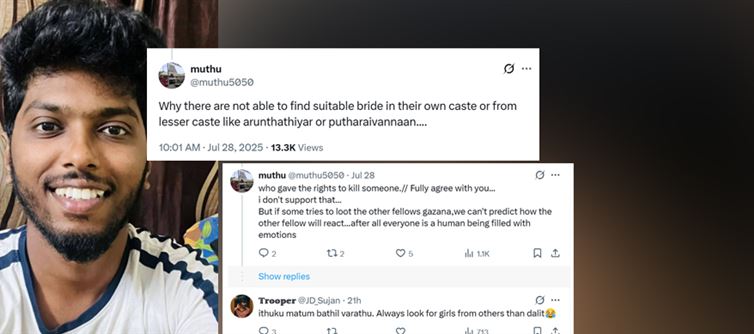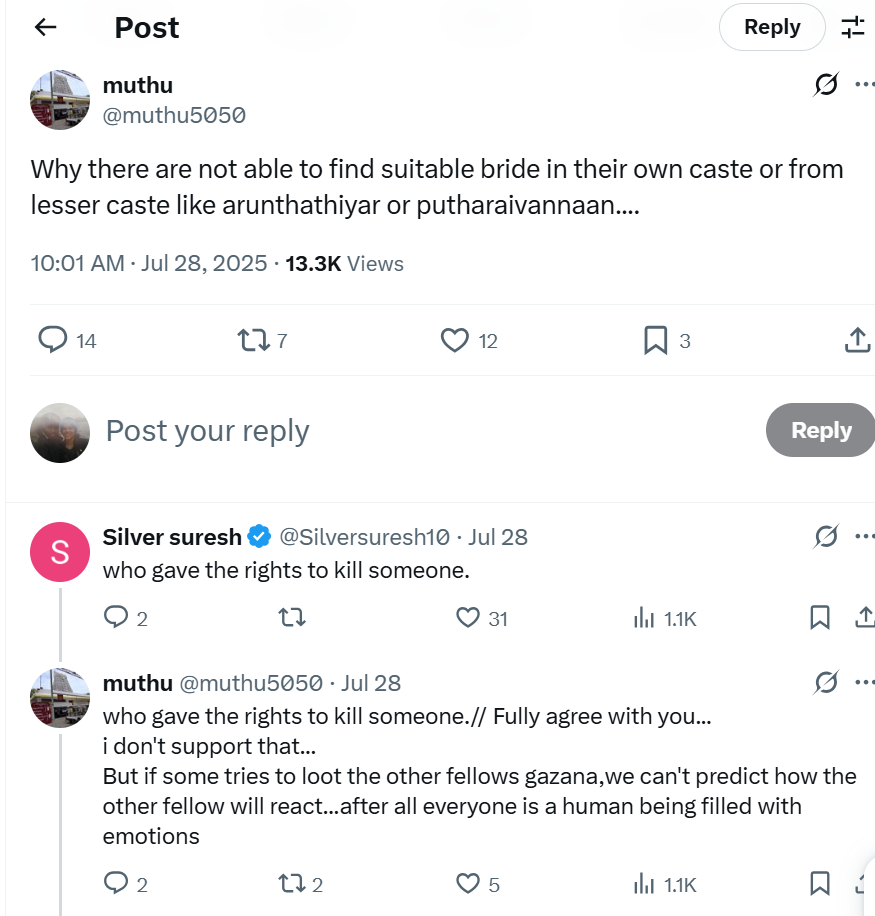
The brutal murder of Kavin, a 27-year-old Dalit software engineer from Thoothukudi, has once again exposed the deep-seated caste hatred that still plagues parts of indian society, even in urban and upwardly mobile circles. Kavin was not only a first-generation graduate but also a university gold medalist, earning a respectable salary, representing the aspirations of millions of young Dalits who strive to rise through education and hard work.
His alleged killer, Surjith—whose parents are both police sub-inspectors—reportedly murdered him in an act of caste-based "honour killing" over Kavin's relationship with Surjith’s sister. The fact that this happened in a supposedly progressive and educated household makes the crime even more chilling.
What followed on social media reveals the other side of India’s ongoing caste conflict—one that is more insidious and cloaked in pseudo-rationality. While many expressed outrage and demanded justice under the SC/ST (Prevention of Atrocities) Act, others deflected the issue by raising questions like: "Why don’t Dalits marry within their own caste or lower castes like Arunthathiyars or Puthirai Vannars?"
 Such comments are not only casteist but also serve to normalize caste boundaries in romantic relationships, undermining individual choice and agency. This line of questioning shifts the focus from the real crime—the murder rooted in caste superiority—to the victim's personal choices, a dangerous and regressive narrative.
Such comments are not only casteist but also serve to normalize caste boundaries in romantic relationships, undermining individual choice and agency. This line of questioning shifts the focus from the real crime—the murder rooted in caste superiority—to the victim's personal choices, a dangerous and regressive narrative.
The online clash between these two viewpoints reveals the deep societal divide on caste and inter-caste relationships. On one side are those who champion constitutional rights, individual freedom, and the breaking of caste barriers, especially in matters of love and marriage. On the other side are those who continue to uphold a rigid caste hierarchy, even attempting to justify violence in its defense.
Kavin’s murder is not just a tragedy—it is a stark reminder that caste isn’t just a rural relic or an electoral statistic; it is a lived reality that still dictates who can love whom, and at what cost. Until society collectively condemns such crimes and introspects on the everyday casteism embedded in both institutions and mindsets, true social progress will remain elusive.
His alleged killer, Surjith—whose parents are both police sub-inspectors—reportedly murdered him in an act of caste-based "honour killing" over Kavin's relationship with Surjith’s sister. The fact that this happened in a supposedly progressive and educated household makes the crime even more chilling.
What followed on social media reveals the other side of India’s ongoing caste conflict—one that is more insidious and cloaked in pseudo-rationality. While many expressed outrage and demanded justice under the SC/ST (Prevention of Atrocities) Act, others deflected the issue by raising questions like: "Why don’t Dalits marry within their own caste or lower castes like Arunthathiyars or Puthirai Vannars?"
 Such comments are not only casteist but also serve to normalize caste boundaries in romantic relationships, undermining individual choice and agency. This line of questioning shifts the focus from the real crime—the murder rooted in caste superiority—to the victim's personal choices, a dangerous and regressive narrative.
Such comments are not only casteist but also serve to normalize caste boundaries in romantic relationships, undermining individual choice and agency. This line of questioning shifts the focus from the real crime—the murder rooted in caste superiority—to the victim's personal choices, a dangerous and regressive narrative.The online clash between these two viewpoints reveals the deep societal divide on caste and inter-caste relationships. On one side are those who champion constitutional rights, individual freedom, and the breaking of caste barriers, especially in matters of love and marriage. On the other side are those who continue to uphold a rigid caste hierarchy, even attempting to justify violence in its defense.
Kavin’s murder is not just a tragedy—it is a stark reminder that caste isn’t just a rural relic or an electoral statistic; it is a lived reality that still dictates who can love whom, and at what cost. Until society collectively condemns such crimes and introspects on the everyday casteism embedded in both institutions and mindsets, true social progress will remain elusive.




 click and follow Indiaherald WhatsApp channel
click and follow Indiaherald WhatsApp channel